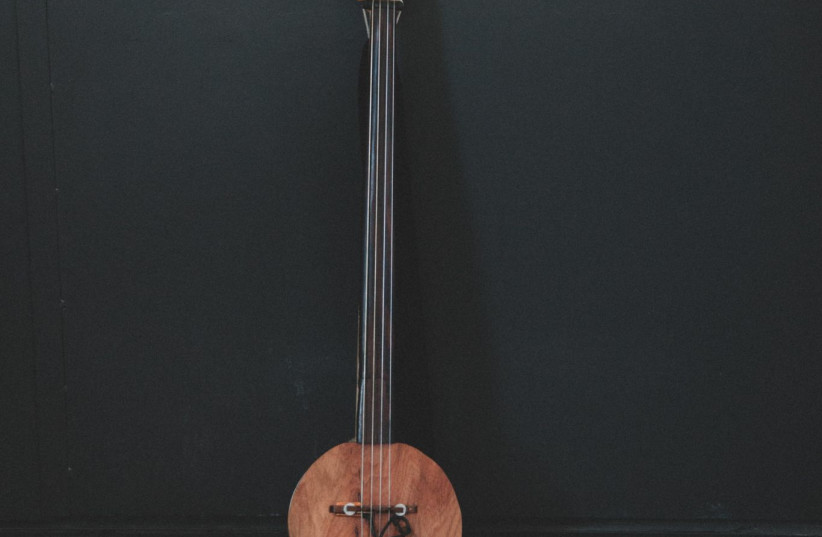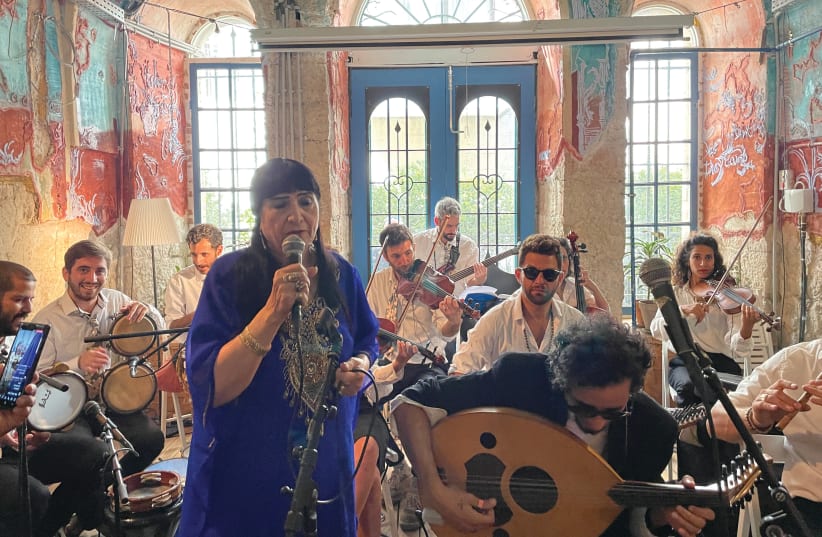The crowd at Jerusalem’s HaMiffal artist space one Friday last month was an eclectic mix, ranging from hipsters to religious Yemenites, all waiting for the El Khat’s Yemenite band to begin. They were treated to two hours of traditional Middle Eastern music by a dozen musicians, who were accompanied by sweet-sounding vocals. The evening was capped by a guest appearance by Yemenite singer Bracha Cohen, who also enthralled the audience.
The following week, the musicians staged a performance at an equally eclectic venue, Mazkeka. This time, it was a smaller group of hip Tel Avivians playing traditional Yemenite music. What connected the two shows was musician Eyal El Wahab, who played a guitar-cello hybrid from the depths of his soul.
El Wahab’s Yemenite parents made aliyah in 1950 shortly after the establishment of the state. Growing up in Kfar Saba, El Wahab found himself surrounded by a world that he says was eager to strip him of his identity. Finding skills in music from an early age – first with a guitar, then a cello – he eventually began a full-time career in music.
Though he played Western music in orchestras, something was missing. “I started to feel that I was missing something in my identity. I didn’t feel complete,” he told The Jerusalem Post. This vacuum led him to create what is today El Khat.


Digging into his Yemenite roots
When digging into his roots, the thirty-something El Wahab discovered the allure of traditional Yemenite music. However, as much as it touched his soul, he found that there was nothing really worth listening to.
“Back then, they did not have recording equipment,” he said, adding that they were simple tunes and lousy recordings. “Besides a few records from Aden, a more advanced city in Yemen, there existed nothing great.”
Now, for El Wahab, El Khat is “giving the music the respect it deserves, especially since it was neglected for so long.”
El Wahab describes Yemenite music as special because it’s based on poverty. “Simple sounds, not well produced; sounds from the street. [Yemenite music] is to ‘make something as bad as it can get until it is the best.’ It serves the goal of the sound you are going for,” he said. El Khat does this by playing a mix of classic folk music with originals produced by El Wahab and the band.
“Simple sounds, not well produced; sounds from the street. [Yemenite music] is to ‘make something as bad as it can get until it is the best.’ It serves the goal of the sound you are going for.”
Eyal El Wahab
El Wahab’s family traces its roots to small villages in Yemen “in the middle of nowhere.” The musician describes Yemenite culture and music stemming from religion and tradition, starting in the synagogue with prayers that are “very lyrical hymns.” However, outside of the synagogue, Yemenites weren’t listening to traditional music; in many cases, it was being cast aside completely. This fit with the larger trend in Israeli music in the 1990s, modeling after mainstream music in the US and other Western countries.
El Wahab describes those around him as “being in denial of Yemenite music. Israel was trying to be a small America.”
He still sees this happening, with much of the pop music leading Israeli charts today following the themes seen in Western music. He admits that “there is a shift these days” with the growth in Israelis who affiliate themselves with Mizrahi music and culture. El Wahab, who has also noticed that El Khat is being invited to more music festivals and concerts, pointed out that “suddenly they care” about bringing culture to people.
WHEN EL Wahab first started El Khat, it surprised and pleased his friends and family. “They couldn’t believe the type of music I was playing.” But while El Khat played its first show in 2018, the group went on hold, since El Wahab had moved to New York City. After a year there, he returned to Israel, eager to get back to work.
If you go to an El Khat performance, you will see El Wahab sitting front and center with what looks like a traditional guitar, though it is a unique invention of his own. The instrument, which he calls the “saucepan” or “pancello,” was the first of a number of guitar-cello hybrids he created to help enhance his unique sound.
When talking about the instrument, he stressed: “Everyone always thinks they are missing something, that they don’t have enough of anything. But you can make something beautiful, which sounds beautiful from nothing.” For El Wahab, this is true of Eastern music too, which to him no one is really playing in Israel today.
The crowd at El Khat’s shows is comprised of all ages and ethnicities, which is interesting due to the band’s unique music. For El Wahab, the traditional music he plays “touches you in some way.” This helps to drive his creativity while he is “always trying to renew.” He cited influences such as Bach, Bulgarian music – of course, Yemenite music – and even architecture and materials in general. The latter two teach El Wahab that “you can take junk and make gold.”
Indeed, you can hear the gold in the music. El Wahab ties it to the idea of Yemenite music, saying it is “based on the fundamentals of trash; things that are not well finished.” This coupling of imperfection helps to create perfection.
The band, which El Wahab describes more as a “project,” today consists of four to five performers at most shows. They have released two albums, and are working on a third. This is alongside an upcoming album with the whole band. They have an upcoming 25-show tour throughout Europe, in addition to frequent shows in Israel.
I asked El Wahab what El Khat’s goal is, both personally and for those listening to his music. His answers demonstrate that his music is deeply rooted in authentic tradition. “[El Khat] brings me closer to myself, as loyal to myself as I can be; following the heart, but not having full satisfaction,” he responded. “This drives me to keep expanding. It is based on the philosophy of using something you don’t have and making it something about life. It is not only about comprehending, [but] also being true to it.”
This brings him back to his youth and El Khat’s growth and subsequent success. El Wahab spoke poignantly that “when people are being racist to people, they start to think they are missing something; in some way they are not good enough. They aren’t part of the bigger group or welcome,” he said.
“This has been going on my whole life – this feeling that you are not where you should be. It comes from people, institutions, everywhere. This led me to realize you have to take your ‘defects’ and make them superpowers.”
For El Wahab, this is more action than just words. Outside of bringing to life his authenticity through music, he works with children of immigrants, helping them to “feel normal where they are.” At the workshops he takes part in, he teaches children how to make their own instruments and play music. Alongside, there are other workshops such as sewing and art – general up-cycling – all based on the philosophy of making the imperfect perfect; the not-normal, normal.
El Wahab is intent on inspiring people to be happy and proud of themselves. This mission is clear from the light and authenticity that emanates from him.
The group’s next performances are on December 15 as part of the Spectrum Festival in Jerusalem; and on December 31, when they open for Dudu Tassa at the Barby Club in Tel Aviv.












